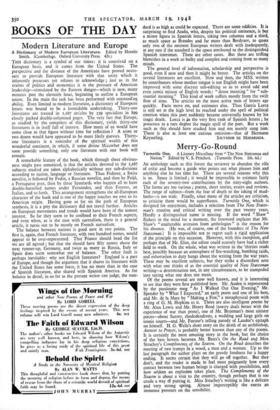BOOKS OF THE DAY
Modern Literature and Europe
A Dictionary of Modern European Literature. Edited by Horatio Smith. (Cumberlege. Oxford University Press. 42s.)
Tins dictionary is a symbol of our times: it is conceived on a European basis, and it comes from the United States. The perspective and the distance of the Americans have proved neces- sary to provide European literature with that unity which it inherently possesses yet refuses to acknowledge ; just as in the realms of politics and economics it is the pressure of American leadership—stimulated by the Eastern danger—which is now, many minutes past the eleventh hour, beginning to outline a European union. In the main the task has been performed with outstanding ability. Even limited to modern literature, a dictionary of European letters was bound to be a formidable undertaking. Thirty-one literatures are treated in 1,167 articles by 239 specialists in 899 closely packed double-columned pages. The very fact that Europe, as studied by the compilers of this dictionary, yields thirty-one literatures is in itself full of interest. How many of us would have come close to that figure without time for reflection ? A score or two dozen would have appeared to be more likely guesses. Thirty- one literatures is a reminder of the spiritual wealth of this wonderful continent, in which, if some divine Micawber does not soon provide something, only one literature with one book will remain.
A remarkable feature of the book, which through sheer obvious- ness might pass unnoticed, is that the articles devoted to the 1,167 subjects studied are taken alphabetically without any sub-divisions according to nation, language or literature. Thus Federer, a Swiss novelist, is followed by Fedin, a Russian novelist, and then by Feijo, a Portuguese poet, then by three Spaniards who happen all to have double-barrelled names under Fernandez, and then Ferrero, an Italian, and so forth. This arrangement strengthens the all-European character of the book and is one of the happy touches we owe to its American origin. Having gone so far on the path of European synthesis, it is a pity the dictionary did not travel further. Articles on European movements and trends would have been of the utmost interest. So far they seem to be confined to their French aspects, and even when, as is the case with surrealism, there is a general article, it turns out to be mostly on French surrealism.
The balance between nations is good save in two points. The first is, again, that French literature, with two hundred names, would appear to be over-represented. That France should head the list we are all agreed; that she should have fifty names above the next runner-up, ermany, and twice as many as Russia, Italy or Spain does seem somewhat out of balance. The other fault is perhaps inevitable: why not English literature? England is a part of Europe, and though the argument that it shares its literature with the United States has some force, it has no more than in the case of Spanish literature, also shared with Spanish America. As for balance in detail, in so far as the present writer can judge, the stan- dard is as high as could be expected. There are some oddities. It is surprising to find Azafia, who, despite his political eminence, is but a minor figure in Spanish letters, taking two columns and a third, as much space as Brandes and far more than Berdyaev, to quote only two of the eminent European writers dealt with inadequately, at any rate if the standard is the space attributed to the distinguished Spanish statesman. There are other cases. But these are trifling blemishes in a work so bulky and complex and coming from so many minds.
The general level of information, scholarship and perspective is good, even if riow and then it might be better. The articles on the several literatures are excellent. Now and then, the MSS. written by contributors whose mother tongue is not English might have been improved with some discreet sub-editing so as to avoid odd and even comic misuse of English words : " dense meaning " for " sub- stantial meaning." This kind of work suffers mostly from the swift flow of time. The articles on the most active men of letters age quickly. Facts move on, and estimates also. Thus Garcia Lorca is still set at the high level he reached under the spell of political emotion when this poet suddenly became universally known by his tragic death. Lorca is ja the very first rank of Spanish letters ; he possesses to a rare degfee the magic spell of the poet. But a work such as this should have studied him and not merely sung him. There is also at least one curious omission—that of Hermann






























 Previous page
Previous page